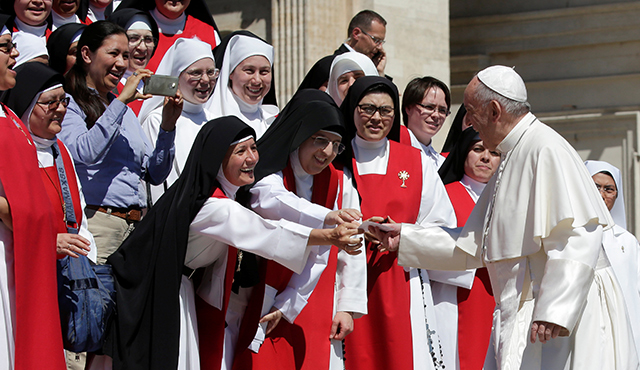ORLANDO, Fla. (CNS) — Sister Mary Pellegrino, outgoing president of the Leadership Conference of Women Religious, urged participants at the group’s annual assembly in Orlando not to focus on dwindling numbers of women religious but instead on the communion they have with each other.
She said the danger of focusing too much on decreasing numbers is that it diminishes every vocation, the church and even God.
“It’s rooted in a corporate God who ascribes to human notions of progress and growth, rather than rhythmic patterns of fruitfulness,” Sister Pellegrino, a Sister of St. Joseph, said in an Aug. 10 talk, adding that concern about smaller numbers also “reflects our fears and our uneasy and unresolved relationship with death.”
She said a new emphasis on deepening communion could be liberating but also challenging.
Sister Pellegrino gave the keynote address during the Aug. 8-11 assembly for the association of the leaders of congregations of Catholic women religious in the United States. LCWR has about 1,350 members, who represent nearly 80 percent of the approximately 48,500 women religious in the United States.
Looking back, she said the “golden age” of religious life happened around World War II and after the Second Vatican Council and its call for renewal of religious life in the 1960s, it was all downhill, according to prevailing accounts that say women religious left teaching in the schools to take secular jobs, swapped habits for street clothes and became feminists.
She said the current story about sisters is that they’re old and dying. But instead of being stuck looking back, she urged women religious to find a new way forward stressing that the groundwork has already begun through the apostolic visitation — a three-year study of U.S. women religious called for by the Vatican — and its findings released in the LCWR doctrinal assessment.
“Consider what God and humanity are asking for today,” she told the women religious leaders, noting that Catholic sisters in the United States are from 83 countries on six continents.
She also asked them to consider the reality of their cultural and ethnic diversity in a country whose government threatens to close or limit access to its borders in some new way each day.
Sister Pellegrino urged them to think about what it would mean to bring the “spiritual maturity and historical depth of centuries-old spiritualties and charisms to bear on the life and development of emerging communities in the church.”
The vitality of consecrated life and its spiritual energy is particularly evident when looking at worldwide gatherings of younger religious, she said, adding that they are more culturally, ethnically and theologically diverse than their older counterparts.
“These women are not naive, nor do they lack a sense of history,” she said. “They’re well aware of the boundaries they’re crossing and equally aware of Pope Francis’ call and reminder to religious men and women everywhere that our life and each of us by virtue of our vocation are to be witnesses of communion in and for a broken world.”
But even though the outgoing LCWR president called for optimism, she ended her presidential address on a somber note, acknowledging the week’s underlying theme of grief and the heartbreak that weighs on sisters outside the assembly.
She said sisters have “vigiled” at too many deathbeds, hosted too many wakes of friends and mentors.
“These are the heartbreaking losses that belong to God’s time and not our own,” Sister Pellegrino said, adding that they grieve together for death, but also for institutional losses that blur their comprehension for what the future holds.
“Our own grief is a gateway to grace, not only for ourselves, but for our world. The grace that will come from embracing this paschal narrative of communion will be costly, but it will not diminish us,” she said. “It will take our best energy and will not consume us. It will open us to the vitality that lies deep at the heart of communion with God, with another and with the wider world. It will help us to speak new languages, and apprehend new images and tell new stories.”
“It will remake us,” Sister Pellegrino said. “And while it is remaking us, we will remake the world.”

